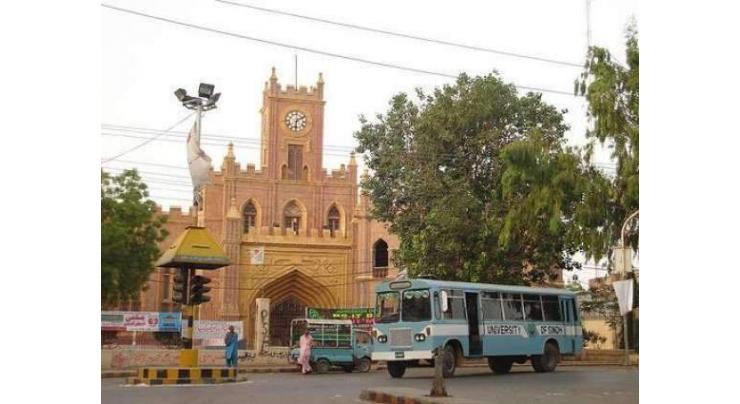
- Home
- Pakistan
- News
- Jinnah's vision bears a way forward to prosperous Pakistan: The conference concludes
Jinnah's Vision Bears A Way Forward To Prosperous Pakistan: The Conference Concludes
Sumaira FH Published October 03, 2018 | 11:03 PM

The speakers at a daylong national conference "Quaid's Vision: Perspective and Prospects" have suggested research and academic interaction on the Quaid vision coupled with education with character, sustenance and promotion of democratic form of government, women empowerment and inter-provincial harmony as a way forward to more prosperous Pakistan.
HYDERABAD, (UrduPoint / Pakistan Point News - 3rd Oct, 2018 ) :The speakers at a daylong national conference "Quaid's Vision: Perspective and Prospects" have suggested research and academic interaction on the Quaid vision coupled with education with character, sustenance and promotion of democratic form of government, women empowerment and inter-provincial harmony as a way forward to more prosperous Pakistan.
The speakers expressed these remarks in their scholarly presentations in different sessions of the national conference organized by Pakistan Study Centre of the University of Sindh at Senate Hall of the Vice Chancellor's Secretariat on Wednesday.
The conference was presided over by the Vice Chancellor Prof. Dr. Fateh Muhammad Burfat while Chairman Department of History and Pakistan Studies University of Lahore Prof. Dr. Muhammad Iqbal Chawla, Associate Professor, National Institute of Historical and Cultural Research Prof. Dr. Sajid Mahmood Awan, Professor, Department of History, University of Karachi Prof. Dr. Humaira Naz, Former Sindh Secretary Culture and eminent scholar Gul Muhammad Umrani and illustrious intellectual Lal Bux Jiskani were speakers at this significant national moot.
Welcoming the guest speakers, Prof. Dr. Burfat observed that Quaid-e-Azam Muhammad Ali Jinnah was great leader who changed the course of history, modified political reality of times and changed the map of the world.
Dr. Burfat said that Quid-e-Azam Muhammad Ali Jinnah was an epitome of courage, valor, tenacity, discipline, faith, hope, indefatigable struggle, decision-making and sacrifice; who knew not 'failure'. "Pakistan is a practical and real version of Quaid's vision, its perspective is bright and prospects magnificent in the light of recent wave of shift of socio-political landscape to a highly positive ethos," he said.
Prof.
Dr. Muhammad Iqbal Chawla said that the Quaid intended Pakistan to be modern nation-state projecting values like peaceful co-existence, inclusivity, pluralism, social Justice and core Islamic injunctions.
He said Quaid e Azam was one of the very few political leaders in the world who believed in the tenet of achieving independence through non-violent, peaceful and transparent transfer of rule through a parliamentary mechanism.
Dr. Sajid Mahmood Awan asserted that it was time to end debate on personal details as regarded life and career of the Quaid- adding that they better invested more energy and effort toward adopting Quaid's character, qualities, caliber and core values, instead of wasteful endeavors at insignificant aspects.
Dr. Humaira Naz opined, life of Quaid e Azam Muhammad Ali Jinnah inspires in us love for all that is true honest, correct and moral adding that Pakistan was a great country, facing a few challenges but also having enviable potential and most talented human resource to chart great future for it.
"Pakistan is there to stay and stay forever on the face of the earth and on the map of the world; as it is home to one of the finest and most talented men and women on the globe," Dr. Naz said.
Scholar Gul Muhammad Umrani said that there was a dire need for inter-provincial, inter-ethnic, inter-cultural and inter-communal tolerance, understanding, cooperation and equality for Pakistan to prosper.
Scholar Lal Bux Jiskani maintained that Jinnah's life was a story of labor of love accentuated by tears, toil, strenuous struggle, self sacrifice, selfless devotion, matchless political acumen and unparalleled vision.
The Incharge Dean, Faculty of Social Sciences Prof. Dr. Naghma Mangrio, in her concluding remarks, presented the conceptual compendium of the conference deliberations.
Related Topics
Recent Stories

PSX gains 771 points

PITB HR Wing organizes Eid Milan celebration for children at PITB Day Care Cente ..

Cabinet briefed on progress of PIA privatization

Meeting held to streamline trade between Pak-Afghan , Central Asian Republics

SONY x TECNO - is this for real?

Progress of Aaghosh, Bunyad, Khud Mukhtar programs discussed

SBP to announce monetary policy on April 29

London stocks hit new record peak on takeovers

Summer School on Understanding Greenhouse Gas Emission and Measurement Technique ..

Rupee sees slight recovery against US dollar

Govt to out source waste management companies to generate revenue

Rawat police arrest four robbers; recover Rs 700,000
More Stories From Pakistan
-
Mohsin Naqvi visits Police Facilitation center, directs 24 hour service for citizens
17 minutes ago -
Citywide anti-encroachment campaign launched: Mayor Karachi
27 minutes ago -
Citizens demand action against professional beggars
27 minutes ago -
KP Open Shooting Gala concludes
27 minutes ago -
Seminar on dengue
27 minutes ago -
Kite seller held
27 minutes ago
-
SCCI for simplifying procedure to enhance arms, ammunition export
37 minutes ago -
Federal Ombudsman KP Office decides to extend awareness campaign to educational institutions
38 minutes ago -

Cabinet briefed on progress of PIA privatization
15 minutes ago -
Setting up modern GTS need of the hour: MD SSWMB
47 minutes ago -
Keamari police bust major gutka smuggling attempt
57 minutes ago -
Minister proposes plan to remove congestion on busy roads in big cities
58 minutes ago
